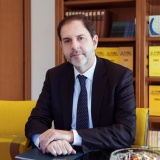
 Alberto Improda
Alberto Improda
Italian design: Astradyne's Design for an Origami in Space
- WTI Magazine #168 Oct 21, 2023
-

 Alberto Improda
Alberto Improda
Aerospace represents a sector where there is a Made in Italy that is as important as it is little known. Our country in the field of aeronautics has a long-standing and established tradition. In 1903 the first flight of the Wright brothers took place, and already on January 13, 1909, the first Italian aircraft, built by Engineer Aristide Faccioli and piloted by his son Mario Faccioli, took to the air in Turin, at the Mirafiori racetrack.
In the 1920s and 1930s, then, world records for speed, height and distance belonged to Italy for a long time, between individual enterprises and mass cruises. Italian companies, coming to the present day, are now international leaders in many fields, including helicopter design, satellite systems, aircraft engines and navigation systems.
Our Aerospace industry boasts an annual turnover of about 4.5 billion euros, with about 50,000 specialized employees, out of a total of 200,000 in the supply chain, whose allied industries engage more than 4,000 companies.
The industry's supply chain is a complex web of specialized companies, covering every aspect of aircraft design, production, assembly and maintenance.
This network of interconnections brings together a wide range of skills and specializations, resulting in an integrated value chain that spans the entire aircraft life cycle.
In this stimulating and effervescent context, interesting start-ups are continuously being born and growing, strongly focusing on the push for Innovation and resorting to Design to field highly modern projects.
Here we want to turn on a focus on Astradyne, a dynamic company that recently won the Primo Round prize, put up for grabs by the 2031 platform, formerly Premio Marzotto, in collaboration with Italian Tech.
The award was given during Italian Tech Week, which took place at Turin's OGR from September 27-29, 2023, and concluded with the presentation of the seven best new startups, selected by a jury of well-known Italian investors.
The young company was born in 1922 in Apulia, an area rich in opportunities to operate in Aerospace, from the meeting of three doctoral students at the Polytechnic University of Bari, their enthusiasm and determination to exploit the knowledge developed at the world's most prestigious academic centers.
Astradyne deals with the development of deployable structures for the space industry, integrating rigid-flexible electronics with textile material.
The company's activity rests on an extremely broad and advanced concept of Design, which starts from product design and extends to the study of materials and the analysis of technological processes.
This cross-disciplinary and holistic approach to Innovation has led to SolarCube, a revolutionary solar panel that opens like origami.
The device, thanks to a fabric substrate, is up to 30 percent lighter, three times more compact, and 50 percent more powerful than solutions currently on the market.
Stefano Buono, scientist and entrepreneur and a member of the award jury, said:
"The strength of this technology is in its ability to reduce space and also it has already been chosen by a major operator like ESA, so for us this is an even greater incentive to invest."
The Astradyne team is looking beyond SolarCube and working on new projects, involving suits for pilots and astronauts, wearable devices, deployable antennas, inflatable space modules, and other aviation and terrestrial sector innovations.
The startup's grit and ambition resonates clearly from the words of Alessia Gloder, the company's CEO:
"We are in the process of raising investments to get to the demonstration of our technology in orbit and then to the commercialization of the product, but since it is in the aerospace sector it will realistically happen in 2025.
In the meantime, we also plan to engage in the green energy sector-our extremely versatile technology allows us to do that."
Aerospace represents a sector in which our country has a prestigious Past and lives an exciting Present.
Alessia Gloder writes in her resume, "There is nothing like a dream to create the future" (Victor Hugo).
So much passion and determination are the best guarantee for a Future of new successes.